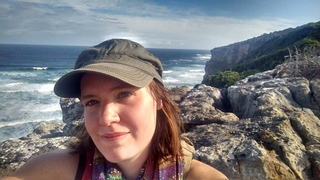PhD candidate Hannah Keller receives NSF Dissertation Improvement award

Hannah Keller will undertake research to understand how changes in resource densities and distribution across landscapes impacted the subsistence strategies, mobility, and social connectivity of foraging communities. Her research will use materials collected from four archaeological sites in southernmost Africa, three along the modern coastline and one in the hinterland, to better assess how forager subsistence strategies, mobility, and social connectivity were impacted across time and space. Previous research demonstrated that this area was subjected to multiple climatic events where the coastline expanded and contracted, resulting in shifts in floral and faunal communities. This project will use ostrich eggs to inform about multiple dimensions of forager life: subsistence (eggs as food), technology (eggs as water containers), and social connections (flasks and OES beads as trade items). It will analyze the eggshell surfaces, chemistry, and organic components, and present a model for using ostrich eggshell fragments more broadly to tackle questions of subsistence and mobility. By examining how foragers used ostrich eggs, we can form a better understanding of how foragers responded to changes in resource distributions, and trace how this response changed over multiple climatic cycles that had clear impacts on coastline resources.